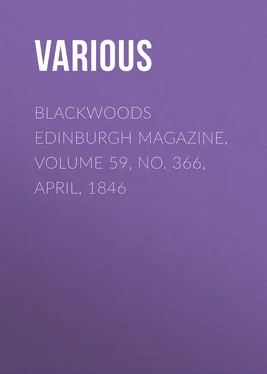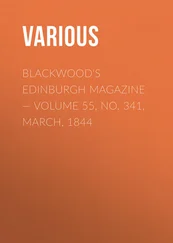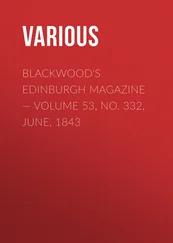Various - Blackwoods Edinburgh Magazine, Volume 59, No. 366, April, 1846
Здесь есть возможность читать онлайн «Various - Blackwoods Edinburgh Magazine, Volume 59, No. 366, April, 1846» — ознакомительный отрывок электронной книги совершенно бесплатно, а после прочтения отрывка купить полную версию. В некоторых случаях можно слушать аудио, скачать через торрент в формате fb2 и присутствует краткое содержание. Жанр: periodic, foreign_edu, Путешествия и география, на английском языке. Описание произведения, (предисловие) а так же отзывы посетителей доступны на портале библиотеки ЛибКат.
- Название:Blackwoods Edinburgh Magazine, Volume 59, No. 366, April, 1846
- Автор:
- Жанр:
- Год:неизвестен
- ISBN:нет данных
- Рейтинг книги:5 / 5. Голосов: 1
-
Избранное:Добавить в избранное
- Отзывы:
-
Ваша оценка:
- 100
- 1
- 2
- 3
- 4
- 5
Blackwoods Edinburgh Magazine, Volume 59, No. 366, April, 1846: краткое содержание, описание и аннотация
Предлагаем к чтению аннотацию, описание, краткое содержание или предисловие (зависит от того, что написал сам автор книги «Blackwoods Edinburgh Magazine, Volume 59, No. 366, April, 1846»). Если вы не нашли необходимую информацию о книге — напишите в комментариях, мы постараемся отыскать её.
Blackwoods Edinburgh Magazine, Volume 59, No. 366, April, 1846 — читать онлайн ознакомительный отрывок
Ниже представлен текст книги, разбитый по страницам. Система сохранения места последней прочитанной страницы, позволяет с удобством читать онлайн бесплатно книгу «Blackwoods Edinburgh Magazine, Volume 59, No. 366, April, 1846», без необходимости каждый раз заново искать на чём Вы остановились. Поставьте закладку, и сможете в любой момент перейти на страницу, на которой закончили чтение.
Интервал:
Закладка:
On the 4th of May, at one in the afternoon, the stormers, commanded by Baird, advanced. He, with some other officers of the 71st, had once been a prisoner, and been cruelly treated in the fortress. The column consisted of two thousand five hundred English, and one thousand eight hundred Sepoys. They crossed the Cavery, the river of Seringapatam; and in ten minutes the British flag was on the top of the rampart! The column now cleared the ramparts to the right and left, and after a gallant but confused resistance by the garrison, this famous fortress was taken. Tippoo, after having his horse killed under him, and receiving two wounds, attempted to make his escape on foot. A soldier, attracted by his jewels, rushed to seize him; Tippoo gave him a cimeter wound in the knee, the soldier then fired, and Tippoo fell dead. The fortress was strongly provided. Its works mounted two hundred and eighty guns. In its arsenal were found four hundred and fifty-one brass guns, and four hundred and seventy-eight iron guns. Stores of every kind were found in abundance. The storm scarcely exceeded an hour. Thus fell the dynasty of the great Hyder Ali; and thus was extinguished a dream of conquest, which once embraced the Empire of Hindostan.
Thus, by promptitude of action and sagacity of council, this formidable war was extinguished in little more than eight weeks; a territory producing a million sterling a-year was added to the Company's dominions; and the whole fabric of a power which it had cost the genius of Hyder a life to raise, and which once threatened to overthrow the empire of the English in India, was broken down and dismantled for ever. But Mysore was given to the family of its former Hindoo Rajah, and simply reduced to the limits of its original territory; the conquests of Hyder having been alone lopped away.
In England, the thanks of Parliament were given to the governor-general and the army, and the former was made a marquess. The treasure taken in Seringapatam, with the various arms and stores, was subsequently valued at forty-five millions of star pagodas, (the pagoda being about eight shillings sterling;) General Harris, as commander-in-chief, receiving an eighth of the whole, or three hundred and twenty-four thousand nine hundred and seven pagodas. His right to this sum was afterwards disputed at law, but the claim was ultimately allowed. One hundred thousand pounds was offered by the army to the Marquess, but honourably declined by him as encroaching on the general prize-money. But the Court of Directors, in recompense, voted him five thousand pounds a-year for twenty years.
We now come to another important period in the career of this distinguished servant of the crown. The French expedition to Egypt had been expressly aimed at the British power in India. The Marquess Wellesley instantly conceived the bold project of attacking the French in the rear, by the march of an Indian army to Egypt, to co-operate with an army from home.
The question of occupying Aden, at the mouth of the Red Sea, was then discussed; and objected to by the marquess, on the several grounds of its unfitness for a naval station, for a commercial station, and for maintaining an influence on the coast. The admiral's opinion was strongly against it, and the design was abandoned. It has been since adopted; but the difference of circumstances must be remembered. We had then no regular overland communication, no steamers on the Red Sea, and thus no necessity for either a harbour or a depot of coals. Aden as a garrison may be of little comparative value, but as a rendezvous for the steam navy, it is of obvious importance, and not less as a means of guarding the overland communication for the general benefit of Europe. The advantages of this station may be the more appreciated, from the following letter of the governor-general to the chairman of the Court of Directors, (October 6, 1800,) – "In the present year I was nearly seven months without receiving one line of authentic intelligence from England. My distress and anxiety of mind were scarcely supportable. Speedy, authentic, and regular intelligence from Europe, is essential to the trade and government of this empire. If the sources of information be obstructed, no conscientious man can undertake this weighty charge."
In 1800, the army under Abercromby landed in Egypt, and defeated the French under Menou. General Baird, at the head of six thousand of the Indian army, reached Egypt. General Belliard surrendered in Cairo with thirteen thousand men. The Indian army then joined the British, and the siege of Alexandria was begun. Menou immediately capitulated, and thus the whole French expedition was undone – the fleet having been destroyed by Nelson, and the army having been captured by Hutchinson – the French army, amounting in the whole to twenty-four thousand men, and their captors only to nineteen thousand British; the Indian army making up the general number to twenty-five thousand six hundred and eighteen.
In July 1801, the Addington cabinet was formed. Peace with France was signed at Amiens, March 27, 1802. Orders were now sent out to India to restore the French possessions. But the Marquess, by his personal sagacity, anticipated another war; and delayed the measure until he should receive further intelligence. The result was, that when Linois arrived with a French squadron to take possession of Pondicherry, Lord Clive answered, "that he had not received any orders from the governor-general." A despatch from Downing Street, of the 18th of March 1803, communicated to him the King's message to parliament declaring war!
It is beyond our limits to enter into the disputes with the directors, which preceded the return of the governor-general to Europe. He was charged with lavishness of living, with the affectation of being the director of the directors, with extravagance in the erection of the palace at Calcutta, and with equal extravagance in the establishment of the Indian college. But these charges have long since been forgotten; they speedily vanished; investigation did justice to the character of the Marquess; and the only foundation for those vague and wandering charges actually was, that he was a man of high conceptions, fond of the sumptuousness belonging to his rank, adopting a large expenditure for its effect on the native mind, and justly thinking that the noblest ornament of an empire is accomplished by literature.
He returned to England in January 1806, and found the great minister dying. On his arrival he wrote to Pitt, who replied by the following letter, dated from Putney: —
"My Dear Wellesley,
"On my arrival here last night I received, with inexpressible pleasure your most friendly and affectionate letter. If I was not strongly advised to keep out of London till I have acquired a little further strength, I would have come up immediately, for the purpose of seeing you at the first possible moment. As it is, I am afraid I must trust to your goodness to give me the satisfaction of seeing you here, the first hour you can spare for the purpose. If you can, without inconvenience, make it about the middle of the day, (in English style between two and four,) it would suit me rather better than any other time, but none can be inconvenient.
"I am recovering rather slowly from a series of stomach complaints, followed by severe attacks of gout; but I believe I am in the way of real amendment. Ever most truly and affectionately yours,
"W. Pitt."The great minister was unfortunately lost to his country and mankind within a week!
Lord Brougham, in his Memoirs of British Statesmen , records the testimony of the Marquess against the common report, that Pitt died of a broken heart in consequence of the calamities of Austria and the breaking up of the continental coalition. The Marquess declares, that Pitt, though emaciated, retained his "gaiety and constitutionally sanguine disposition" to the last, expressing also "confident hopes of recovery."
Читать дальшеИнтервал:
Закладка:
Похожие книги на «Blackwoods Edinburgh Magazine, Volume 59, No. 366, April, 1846»
Представляем Вашему вниманию похожие книги на «Blackwoods Edinburgh Magazine, Volume 59, No. 366, April, 1846» списком для выбора. Мы отобрали схожую по названию и смыслу литературу в надежде предоставить читателям больше вариантов отыскать новые, интересные, ещё непрочитанные произведения.
Обсуждение, отзывы о книге «Blackwoods Edinburgh Magazine, Volume 59, No. 366, April, 1846» и просто собственные мнения читателей. Оставьте ваши комментарии, напишите, что Вы думаете о произведении, его смысле или главных героях. Укажите что конкретно понравилось, а что нет, и почему Вы так считаете.












